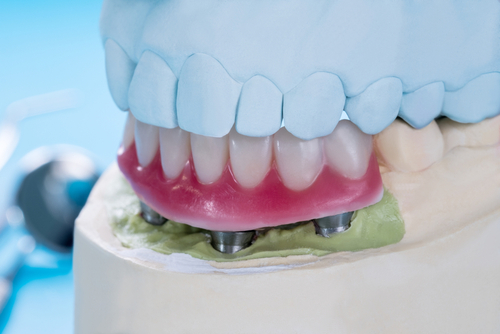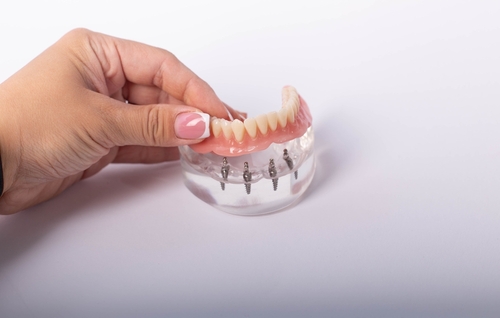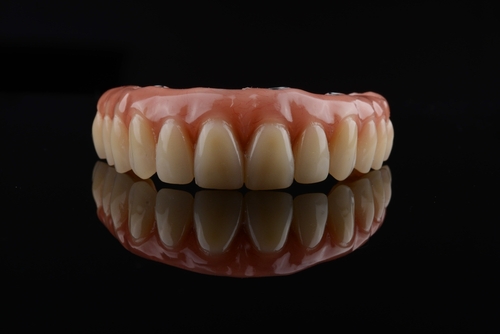Dentures have long been a popular solution for replacing missing teeth and restoring smiles. Traditional dentures, however, often come with challenges such as stability issues, discomfort, and difficulty with eating and speaking. This has led to the development of implant-supported dentures, which offer a more secure and comfortable alternative. In this article, we will explore the pros and cons of both implant-supported dentures and traditional dentures, helping you make an informed decision about the best option for your dental needs.
What Are Implant-Supported Dentures?
Implant-supported dentures are dental appliances used to replace missing teeth. Unlike traditional removable dentures, which sit on the gums, implant-supported dentures are anchored in place by dental implants. Dental implants are titanium screws that are surgically placed into the jawbone, providing a stable foundation for the dentures. This innovative approach offers several advantages over traditional dentures, including improved stability, enhanced aesthetics, superior comfort, and preserved jawbone health.
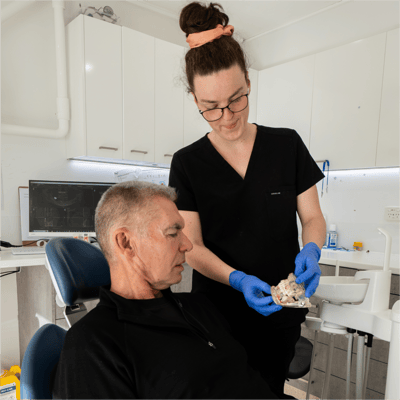
The Pros of Implant-Supported Dentures
Pro #1: Enhanced Jawbone Preservation
One of the significant benefits of implant-supported dentures is their ability to preserve the jawbone. When natural teeth are lost, the jawbone can deteriorate over time. Traditional dentures do not stimulate the jawbone, leading to bone loss and changes in facial appearance. In contrast, implant-supported dentures provide the necessary stimulation to the jawbone, preventing bone resorption and maintaining a more youthful facial structure.
Pro #2: Improved Stability and Functionality
Traditional dentures can sometimes be unstable, causing discomfort and difficulty while eating and speaking. Implant-supported dentures, on the other hand, are securely anchored to dental implants, providing excellent stability and functionality. With implant-supported dentures, you can confidently enjoy your favourite foods and engage in social activities without worrying about denture slippage.
Pro #3: Enhanced Aesthetics
Implant-supported dentures offer superior aesthetics compared to traditional dentures. The natural-looking artificial teeth are custom-made to match your existing teeth, creating a seamless and beautiful smile. Additionally, implant-supported dentures do not cover the roof of the mouth, improving speech clarity and making them visually indistinguishable from natural teeth.
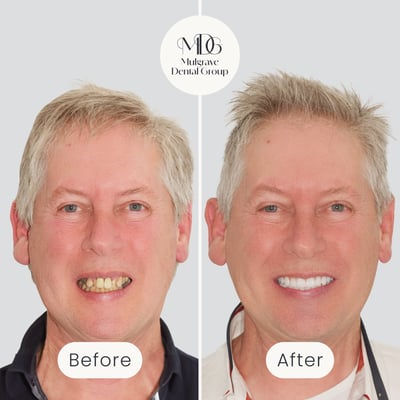
Time Taken After Procedure: 2 weeks after treatment
Pro #4: Increased Comfort
Traditional dentures can cause sore spots and discomfort due to their reliance on the gums for support. Implant-supported dentures eliminate these issues by distributing the biting and chewing forces more evenly across the dental implants. This not only improves comfort but also reduces the risk of denture-related pain and irritation.
Pro #5: Improved Quality of Life
Many individuals who have switched from traditional dentures to implant-supported dentures report a significant improvement in their overall quality of life. The enhanced stability, comfort, and aesthetics of implant-supported dentures allow individuals to regain confidence and enjoy a more natural and unrestricted eating and speaking experience. The preservation of jawbone health also contributes to a youthful appearance, boosting self-esteem.

Time Taken After Procedure: 2 weeks after treatment
The Cons of Implant-Supported Dentures
Con #1: Higher Cost But a Long Term Investment
One of the primary drawbacks of implant-supported dentures is their higher cost compared to traditional dentures. The placement of dental implants requires surgery, and the materials used for implant-supported dentures are typically more expensive. Additionally, the need for regular check-ups and potential adjustments can add to the overall cost. However, many patients find that the long-term benefits of implant-supported dentures outweigh the initial investment.
Con #2: Surgical Procedure
Another consideration is the surgical nature of implant-supported dentures. The placement of dental implants involves a surgical procedure, which may cause anxiety or discomfort for some individuals. Additionally, the recovery period can take several months, as the implants need time to fuse with the jawbone before the dentures can be attached. However, the majority of patients find that the results justify the temporary inconvenience.
At Mulgrave Dental Group, we offer the option of sedation or sleep dentistry to ensure that our patients are comfortable and relaxed throughout the entire procedure, making it easier to manage any anxiety or discomfort associated with the surgery.
Con #3: Not Suitable for Everyone
While implant-supported dentures are an excellent solution for many individuals, they may not be suitable for everyone. Patients with insufficient jawbone density or gum disease may require additional treatments, such as bone grafting or gum therapy, before they can receive dental implants. Certain medical conditions, like uncontrolled diabetes or autoimmune diseases, may also affect the success of the implant procedure. However, advancements in dental technology have led to the development of digital dentures, which provide a precise fit and can be a viable alternative for patients with specific limitations.
Traditional Dentures: Pros and Cons
Pro #1: Affordability
Traditional dentures are generally more affordable than implant-supported dentures. They do not require surgery or dental implants, reducing the overall cost of treatment. For individuals on a limited budget, traditional dentures may be a more accessible option.
Pro #2: Non-Invasive Procedure
Unlike implant-supported dentures, traditional dentures do not require a surgical procedure for placement. The process involves taking impressions of the mouth and creating custom-made dentures that rest on the gums. This non-invasive approach can be appealing to individuals who prefer a less complex treatment option.
Con #1: Stability and Comfort Issues
Traditional dentures rely on suction or adhesive pastes to stay in place, which can sometimes be unreliable. Ill-fitting dentures may move or slip during eating or speaking, causing discomfort and embarrassment. Additionally, traditional dentures cover the roof of the mouth, which can affect the taste and texture of food.
Con #2: Jawbone Deterioration
As mentioned earlier, traditional dentures do not stimulate the jawbone, leading to bone loss over time. This can result in changes in facial appearance and the need for periodic adjustments or relining of the dentures.
Con #3: Dietary Restrictions
Due to the potential for denture slippage, individuals with traditional dentures may need to avoid certain foods that are difficult to chew or sticky in texture. This can limit dietary choices and impact overall enjoyment of meals.
Ready to Restore Your Smile?

Time Taken After Procedure: 2 weeks after treatment
When it comes to replacing missing teeth, both implant-supported dentures and traditional dentures have their own advantages and disadvantages. Implant-supported dentures offer enhanced stability, improved aesthetics, and increased comfort, providing a more natural and secure solution. However, they do come with a higher cost and involve a surgical procedure. Traditional dentures, on the other hand, are more affordable and non-invasive but may have issues with stability, comfort, and jawbone preservation.
Ultimately, the choice between implant-supported dentures and traditional dentures depends on your specific dental needs, budget, and personal preferences. Consulting with a dentist who specialises in denture solutions can help you determine the most suitable option for achieving a confident smile and optimal oral health.
At Mulgrave Dental Group, we provide personalised treatment advice to help you make an informed decision and get the smile you deserve. Call us on (03) 9562 5156 or book a dental consultation online to explore the best options for you.

Smile Makeover Client
Your Healthier Smile Awaits
Whether you're looking to improve your dental health or enhance your smile, we're here to help. Book an appointment with Mulgrave Dental Group today!
Book Now